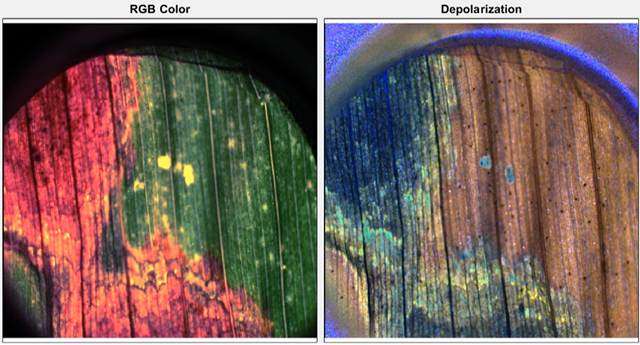After careful consideration of the many proposals we received in our first Seed Grant RFP, we chose three projects that align well with our mission to advance innovation in sensors and sensor systems, while providing unique interdisciplinary training for a graduate student team.
Awardee PIs Michael Kudenov (College of Engineering, Electrical and Computer Engineering), Brendan O’Connor (College of Engineering, Mechanical and Aerospace Engineering), and Anna Locke (College of Agricultural and Life Sciences, Crop and Soil Sciences) collaborated on their proposal.

“Concentric lesion” maize mutant image courtesy of Peter Balint-Kurti.
Left is conventional color and right is a polarization metric (depolarization), which is one (of several) parameters the project will measure.
Their project, Intrinsic polarization transceivers for on-plant polarimetric sensing, suggests a new way to monitor plant health amidst climate change using non-invasive optical sensors with polarized light. The goal is to understand the connection between photosynthesis and optical signals – beyond color and fluorescence – and to create efficient on-plant sensors. Initial tests on maize and soybean show that combining polarization and spectral data improves accuracy in predicting photosynthesis. This sets the stage for innovative on-plant sensors for real-time monitoring. The research will explore the relationship between photosynthesis and spectral/polarization signatures and determine the best detector specifications. The proposal highlights potential progress in plant health monitoring through polarimetry and novel device architectures, aiding adaptation to climate change-related challenges in agriculture.
Congratulations to the team of researchers! We’re excited to hear your results.


